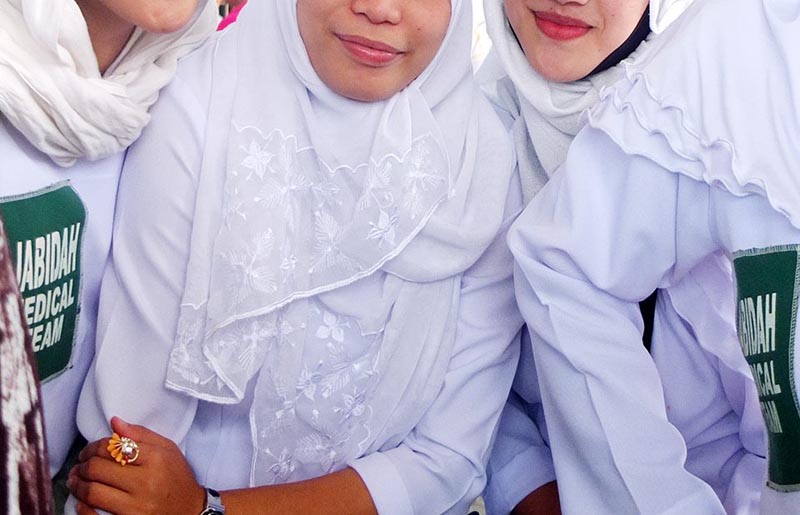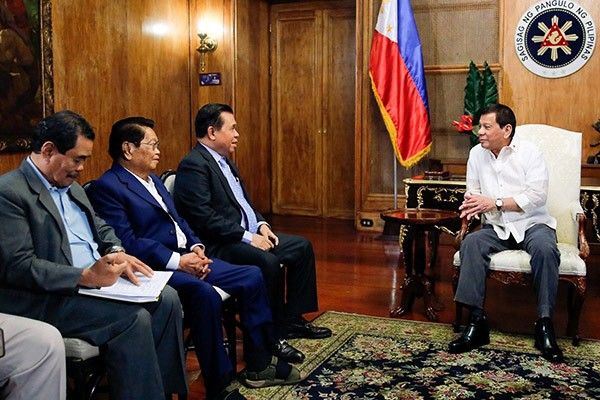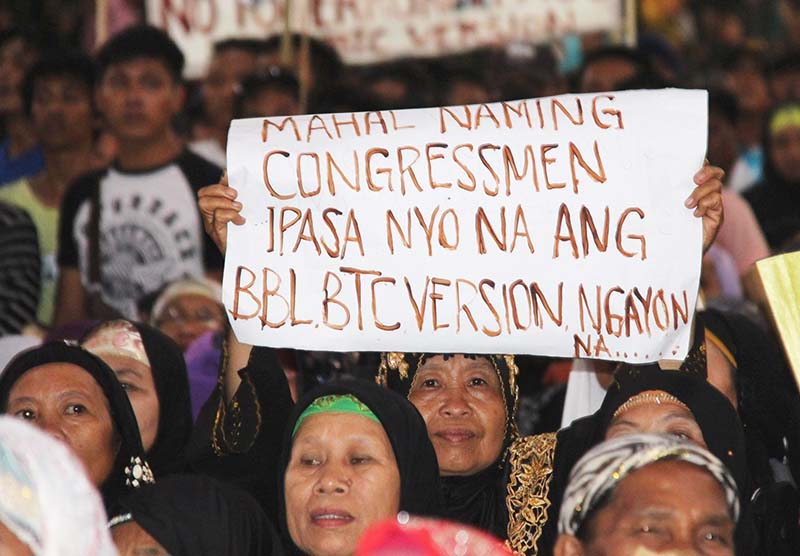The Story of Jabidah: A long negotiation in the struggle for peace
March 18, 2018 | 4:10pm

The Jabidah Medical Team is made up of volunteers who assist in medical missions, with the guidance of Dr. Norlailah Macar, head of the MILF's Northwestern Mindanao Front Medical Team. Marrian Pio Roda Ching
COTABATO CITY, Philippines — Before the massacre of young Bangsamoro men on the island of Corregidor on March 18, 1968, Jabidah was nothing but a name of a beautiful woman of Muslim lore.
Everything changed during the time of the late dictator Ferdinand Marcos.
There are different versions of the story, but the gist of all these versions are the same.
During the Marcos regime, men from the island provinces of Basilan, Sulu, and Tawi-tawi – mostly from the Tausug and Sama tribes – were recruited by the Philippine Army in December 1967 and later transferred to Corregidor as members of a special commando unit named Jabidah to be trained for Operation Merdeka, a secret plan that involved destabilizing and taking over Sabah, a part of Malaysia that was just newly established as a federation in 1963.
The men eventually learned about the operation they were especially recruited for, and the operation meant they will be sent to fight their Muslim brothers and possibly kill their Tausug and Sama relatives who live in Sabah.
Apart from this, abuse and discrimination against them were rife during the training – they were not paid wages that were promised and were served meager food. Soon, they demanded to be sent home.
One night, their military handlers began to take them by the dozen. They were told they would be brought home, but that the plane can only carry 12 people. Once at the airstrip, they were executed as soldiers shot them with machine guns and made sure that not one of them survived.
The number of Bangsamoro men killed in Corregidor ranges from a little over ten to almost a couple of hundred. No one could give exact numbers, but the number hardly ever mattered especially when thousands of Bangsamoros were killed in massacres carried out by government and paramilitary forces in the later years of the dictatorship.
The Jabidah Massacre, however, is credited as the event that sparked and set the Moro liberation movement aflame.
In recent years, the landscape of Corregidor has learned to tell the story of the massacre.
In 2015, a marker for the "Mindanao Garden of Peace" was installed by the National Historical Commission of the Philippines (NHCP), affirming that the island "served as a camp for training Moro youth as a secret group led by the Philippine Army" and that reports of killings [...] sparked the conflict in Mindanao which led to a national crisis in the 1970s."
I first saw the marker in 2016, and peace advocates and government officials whom I talked to told me that it represented a moment of triumph in the Bangsamoro struggle against centuries of historical injustice in the Philippines.
The impact is especially striking because it speaks of the killing of Bangsamoro men by Philippine government forces in an island that Philippine history usually associates with honor and valor. Such is the island's importance to Philippine history that a national holiday now known simply as "Araw ng Kagitingan (Day of Valor)" was once called "Bataan and Corregidor Day."
A few steps away from the NHCP marker is a smaller one, installed seven years earlier. The Jabidah marker, signed by then Anak Mindanao Rep. Mujiv Hataman, is "dedicated to the Moro youth who were killed" in the massacre that "sparked the Bangsamoro struggle for national self-determination." That was when I realized that the NHCP marker made no mention of Jabidah, let alone Marcos or Merdeka.
On an island where their histories finally meet, the Filipino still offers token gestures as it fails to fully recognize the Bangsamoro.

In this Sept. 4, 2017 photo, President Rodrigo Duterte meets with Moro Islamic Liberation Chair Al Haj Murad Ebrahim during a meeting in Malacañan Palace. Also joining Murad are Bangsamoro Transition Commission Chair Ghazali Jaafar, and Moro Islamic Liberation Front peace implementing panel Chair Mohagher Iqbal. Rolando Mailo/Presidential Photo, file
Jabidah Medical Team
The people of Masiu know a multitude histories. Located along the shoreline of Lake Lanao, Masiu is a fifth-class municipality that carries the name of one of the four states of Lanao (Pat a Pangampong a Ranao), is known as the birthplace of former Moro Islamic Liberation Front (MILF) Vice Chairman Aleem Abdul Azis Mimbantas, and has been the site of armed encounters and mass evacuations across decades of struggle.
"There have always been soldiers here, in the same way that the MILF has always been here. I remember being scared of soldiers when I was still a child. My friends and I were so scared that we would hide if we see even just one soldier outside our house. But it's different now, and the difference is because of the peace process. In a way we have won the peace here," Fatima*, a 22-year-old volunteer working with the MILF Medical Team told me when I asked her about life in Masiu.
"This isn't our first time on a medical mission. Usually, in events like this, there are really a lot of people, which also means a lot of soldiers are present. The MILF are present, too. It's a gesture of unity. We've come a long way," she said.
It was 2015, and we met during an outreach program in her hometown. She was wearing an all-white ensemble together with about a dozen women, including her sister, whom she introduced during our conversation. On their blouses were a pop of color, courtesy of a green patch with the words "Jabidah Medical Team" silkscreened in white.
I asked about the patch, confused but curious, given what I knew of Jabidah then. She smiled as she said my question was "inevitable," especially from those who recognize the name.
"We expected people to ask when we decided to name our group 'Jabidah', a word that we know may or may not be familiar to the people. Regardless of who is asking about our name, it presents us with an opportunity to tell the story of our struggle. It helps those who are familiar with the massacre to remember our history as Bangsamoros, while it presents an opportunity to learn for those who are unfamiliar with our struggle for self-determination," Fatima said.
I asked Farjana*, Fatima’s younger sister, about what she thought about the name. "Before becoming the name of a massacre, Jabidah was a woman's name," she told me.
"In the team, we are all women, and I think telling the story of Jabidah has a different effect on people when women like us tell it. Our men were killed, and for every man there was a mother or a sister or a wife or a daughter who mourned his death. Imagine how heavy it would be if he had all these women in his life, and all these women carried their share of grief," she said.
The Jabidah Medical Team is made up of volunteers who assist in medical missions, with the guidance of Dr. Norlailah Macar, head of the MILF's Northwestern Mindanao Front Medical Team. On that day, there were 12 other volunteers together with Fatima and Farjana, who had their parents present with them.
"Both of our parents are always with us during medical missions," Fatima said. "It’s encouraging."
The Bangsamoro Basic Law
Farjana agreed with her sister as she spoke of her future plans with the Jabidah Medical Team. "We want to organize our own medical mission someday. During every mission, we observe how things are run and we try to experience as much as we can. We learn to acknowledge the role of each volunteer so we can function as one," she said.
I asked her what she thought of the Bangsamoro Basic Law (BBL). It had been five months after the Mamasapano encounter, and a few days after the House of Representatives rescheduled their deadline for the passage of the BBL yet again.
"Everybody talks about the Bangsamoro Basic Law, but what they should understand is that it's not just for the Bangsamoro. It's for everyone. What we want is unity, and we should strive for peace for all," Farjana said.
"A just peace based on the fulfillment of the peace process is a different story from the peace we have achieved here. Just and lasting peace takes commitment, and if we are able to commit here in our own communities, I see no reason for the national government not to," Fatima said.
"As Bangsamoros, we are often told that peace is not just borne out of sweat, but of tears and blood. After everything we have given as a sign of our commitment to peace, I'm not sure what else is asked of us, when honestly there is nothing else left for us to give. We have given our all."

A Moro woman flashes a written appeal to lawmakers who presided over consultation on the draft Bangsamoro Basic Law in Buluan, Maguindanao this month. Philstar.com/John Unson, file
It's been three years since the conversation I shared with Fatima and Farjana, and two years since I first stepped into the Mindanao Garden of Peace.
Today, the Bangsamoro people are commemorating the 50th anniversary of the Jabidah Massacre as they await the passage of the BBL, based on a new draft submitted by the expanded Bangsamoro Transition Commission.
Earlier this year, both the Senate and the House of Representatives said that the BBL will pass before Congress adjourns on March 21.
Four days ago, according to a Facebook post by presidential spokesperson Harry Roque, both the Senate and House of Representatives have moved the deadline for BBL passage to May 30.
Marrian Pio Roda Ching is a writer and human rights advocate based in the Bangsamoro.
BrandSpace Articles
<
>
Philstar
- Latest
Latest
Latest
December 9, 2024 - 2:53pm
By Rupert Paul Manhit | December 9, 2024 - 2:53pm
December 8, 2024 - 9:00am
By Jing Castañeda | December 8, 2024 - 9:00am
November 30, 2024 - 5:19pm
By Joanna Perfecto | November 30, 2024 - 5:19pm
November 23, 2024 - 6:23pm
By Rupert Paul Manhit | November 23, 2024 - 6:23pm
November 23, 2024 - 1:52pm
By Edilberto de Jesus | November 23, 2024 - 1:52pm
November 14, 2024 - 7:00am
By Cielo Magno | November 14, 2024 - 7:00am
Recommended





























